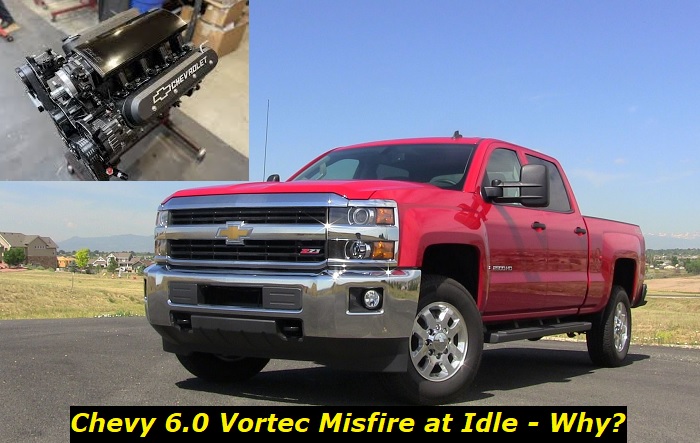A misfire at idle and a P0300 code in your Chevy 6.0 engine means that there is a problem with the ignition, injection, fuel pressure, or ECU. This error code means that the misfire most likely occurs in different cylinders rather than in a certain cylinder. Also, it means that either the electrical part is malfunctioning or there is a problem with the fuel supply.
P0300 code highlights
- Level of urgency:Medium
- Possible culprits:Bad plugs, bad coils, issues with fuel supply, air supply problems
- Price for repair:$100 - $550
- If neglected:Loss of power, harsh work, inefficient fuel consumption, vibrations
- DIY repairs:Possible but complicated
- Can you drive?Yes

What kinds of symptoms are possible when the engine misfires at idle?
First of all, you should understand that the misfiring V8 engine is not the same as the misfiring 4-cylinder engine. While smaller engines will immediately lose power and make it impossible for you to ignore the problem, the bigger engines may feel like they are OK. Even if two cylinders malfunction, you will still have 6 cylinders that work well.
But still, you will obviously feel some consequences if there are multiple misfires in your 6.0 Chevy engine.
Here are some of them:
- the engine will vibrate - this is the first symptom of misfiring cylinders because the engine loses its balance;
- the engine will make rattling noise - this won't be consistent but it will show up from time to time;
- you will notice worse gas mileage - because of losing efficiency, the engine will obviously burn more fuel;
- the idling engine will feel harsh - idling RPM will most likely go up and down a little as the ECU will try to keep the engine running;
- you will see the check engine light - it will be triggered by the P0300 code or the codes from P0301 to P0308;
- the engine will slightly lose power which will obviously be felt when driving aggressively or towing something.
If one cylinder malfunctions, the effects will not be that bad, you will just slightly feel something changing. But if several cylinders fail, the problems will be obvious and the engine may even stall when idling. This often happens when the code P0300 triggers the check engine light. It means that the ECU can't find out which exactly cylinder malfunctions.
If you see the code P0303, for example, you can clearly know that the problem is with the third cylinder. You can check the spark plug and the ignition coil in this cylinder and measure compression there. In most cases, you will find the culprit of the problem by making these steps. But what if it's P0300?
Reasons for Chevy 6.0 misfire at idle in multiple cylinders
So, you know what to do if the OBD2 scanner says that a certain cylinder misfires. But what should you do if the code is P0300 and the ECU doesn't point to a certain cylinder?
In this case, you need to pay attention to wider problems that can cause engine misfires in the 6.0 Vortec engine. These problems are extremely common in the Silverado HD, Chevy Express, Suburban, GMC Sierra HD, Savana, and Yukon XL.
Here are the most common reasons for the problem:
1. Problems with ignition coils
Although this is not the most obvious reason to check, the problems with the ignition coils may well be the reasons for your problems with the 6-liter engine. Several coils may go bad and several cylinders will misfire after that.
In this case, it's hard to check the coil just by swapping it with another cylinder, so you will most likely need professional help in inspecting the coils.
2. Spark plugs are fouled
Unfortunately, 6.0 Vortec engines may burn quite a lot of oil when working. It means that the spark plugs and valves are always under the attack of carbon buildup. Even if you changed the spark plugs just several months ago, it doesn't automatically mean that they are OK.
Very often, spark plugs are fouled because of carbon buildup. Just take them out and look at them. If the tip and the isolation of the firing tip are black, the spark plug is not working properly.
3. ECU is causing problems
Quite often the problem can be with the ECU which sends wrong signals to the ignition coils and this may cause ignition timing problems. This will obviously cause multiple misfires in many cylinders and will most likely prevent the engine from working at all.
ECU may do that because of water damage, physical impact, overheating, or just some failure that needs to be inspected and repaired.
4. Fuel pressure issues
Quite often, the problem can be with the fuel pressure when the pump is dying. Low pressure of the fuel may easily cause misfires because it just fails to supply the needed amount of fuel to prepare the proper air-fuel mixture for your engine. So, sometimes, certain cylinders may misfire.
Also, the fuel injectors may be the issue. They may not be getting proper signals from the ECU or they may be clogged or broken. Anyway, the fuel supply will be affected and the engine will start misfiring.
5. Compression in the engine
The issues with the compression may be because of dozens of different problems. These are cracks in the block or head, bad head gasket, worn-out valves, bad piston rings, cracked pistons, etc. Even measuring compression is a task for professionals, let alone diagnosing and inspecting the engine after understanding that the compression is not perfect.
When there is not enough compression, sometimes, the fuel will not be burnt. That's why, some cylinders may misfire.
What should you do when your 6.0 Vortec misfires?
Many people ask if they can drive their GM vehicles when the 6.0 engine misfires. It's not the best idea to just keep driving and ignore the problem. But you can still drive your car to the nearest repair shop or to the dealership.
If you notice that your engine misfires, don't make it do the work like hauling or towing something. Just carefully drive to the repair shop and have the car inspected.
Alternatively, you can do some research on your own:
- check the codes that your ECU stores, clean them, turn on the engine, and see which codes reappear;
- check the coils and spark plugs - you can check them by just swapping them and see if the code changes in the ECU (unless you have the P0300);
- make sure there is enough fuel in the tank and it's of normal quality;
- try resetting the ECU by disconnecting the battery (first, disconnect the negative terminal, then the positive one).
If you couldn't solve the issue or find the actual reason for the misfire, have the vehicle properly inspected. Mechanics will check the codes, measure the compression in each cylinder, check the fuel pressure, and make all the other inspection steps that are needed for locating the problem and eventually solving it.
Unfortunately, even coil replacement for the 6.0 Vortec engine is not a cheap task, so you will have to prepare some money to solve this problem.
Can you prevent your Chevy 6.0 engine from misfiring?
You may know that the best (and the cheapest) way of dealing with almost any problem in your vehicle is to prevent this problem from happening. In the case of the engine misfiring this is not that easy to do.
Here's what you may try with your 6.0 Vortec:
- Change spark plugs more often. You may want to change the spark plugs at least every 30,000 miles or even 20,000 miles to avoid failing. Especially, if your engine burns some oil.
- Deal with oil burning. If your 6.0 GM engine burns more than 1 quart of oil per 1000 miles, you should deal with this issue to avoid carbon buildup in the combustion chamber.
- Change ignition coils every 80,000 miles. The coils are unfortunately not eternal here and they should be replaced from time to time.
- Change all filters regularly. When changing oil, don't forget that your car has air, fuel, and oil filters that need to be changed regularly.
- Have the vehicle inspected at every oil change. Regular inspection will help you identify all the problems in the vehicle at the early stages.
Now you know what to do when you already have a misfiring 6.0 engine in your GM vehicle and also how to prevent this issue from happening. This is important to know for any owner of a vehicle equipped with this engine because misfiring is one of the common problems a lot of people report.
About the authors
The CarAraC research team is composed of seasoned auto mechanics and automotive industry professionals, including individuals with advanced degrees and certifications in their field. Our team members boast prestigious credentials, reflecting their extensive knowledge and skills. These qualifications include: IMI: Institute of the Motor Industry, ASE-Certified Master Automobile Technicians; Coventry University, Graduate of MA in Automotive Journalism; Politecnico di Torino, Italy, MS Automotive Engineering; Ss. Cyril and Methodius University in Skopje, Mechanical University in Skopje; TOC Automotive College; DHA Suffa University, Department of Mechanical Engineering






Add comment